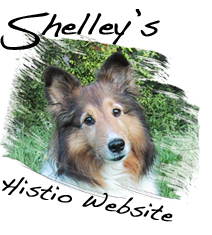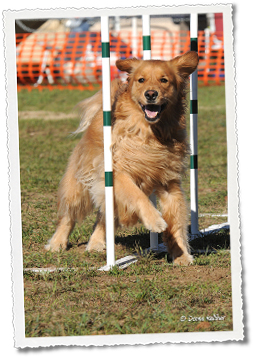
HOME
 YOUR HISTIO STORY
YOUR HISTIO STORY
I am looking for similarities
in all individual cases of
Histiocytic diseases.
I wonder if we all tell our
stories we might come up
with some commonality
between the specific
situations in which all of
our pets got this disease.
So please email me the
details and I'll put your
pets story on Shelley's
Histio Website
 UW HISTIO VERHAAL
UW HISTIO VERHAAL
Ik ben op zoek naar
overeenkomsten in alle
individuele gevallen van
Histiocytose.
Ik hoop dat wanneer wij
onze Histio verhalen
vertellen, wij overeen-
komsten ontdekken over
de manier waarop onze
huisdieren deze ziekte
hebben opgelopen.
Stuur mij de details en
ik zal het verhaal van uw
huisdier op de Histio
website van Shelley zetten.
 WARNING !
WARNING !
These stories are all
different. Individual
symptoms, situations
and circumstances
may vary and response to
therapy is not always the
same.
- Disclaimer -
 WAARSCHUWING !
WAARSCHUWING !
Deze verhalen zijn allemaal
verschillend. Individuele
symptomen, situaties en
omstandigheden kunnen
verschillen en de reactie
op therapie is niet altijd
hetzelfde.
- Disclaimer -
HISTIOCYTOSIS IN
OTHER LANGUAGES
German - Hund
Maligner Histiozytose
French - Chien
l'Histiocytose Maligne
Italian - Canis
Maligni Histiocytosis
Spanish - Perros
Histiocitosis Maligna
Dutch - Hond
Maligne Histiocytose
HOME
Rosie
Histiocytic Sarcoma
Golden Retriever
Female
2005 - August 23rd, 2011


My 6 year old Golden Retriever Rosie was diagnosed with histiocytic sarcoma at age 4 in March of 2009. She had a tumor contained in the left flank, deep in the muscle. They ended up doing 2 surgeries, 1 to take out the tumor and then 1 to go in and take more margin after the diagnosis, which was based on the biopsied tumor. She received CCNU and Cytoxin (Cyclophosphamide) for about 4 cycles to ensure that nothing else was growing.
Early in 2010 she began limping. I read on the internet that limping can be a sure sign that the cancer has returned. The vet didn't find anything - we did anti-inflammatory meds and each time she went off them, the limping came back. Finally, I was referred to an orthopedic vet. He found a very small bump high on the rib cage under the left front leg. We went back to NEVOG (the New England Veterinary Oncology Group). After a scan and an x-ray and anesthesia for another biopsy, it was confirmed that the cancer was back. It was in the connective tissue and potentially the lymph (not confirmed), so surgery was not an option. They gave her 6 mos to live, that was July 2010.
We went back on the CCNU and Cytoxin cycles and she did very well. She needed Rimadyl to contain the inflammation. The tumor did not shrink or go away, but it did not grow or spread either. She continued competing in agility, remained very active and had no side effects from the chemo, other than some lethargy for a day each time the chemo was administered.
In March of 2011, I went away for a business trip for a week and when I came back, I felt new growths in the area and her limping was getting worse. I brought her back to NEVOG and they aspirated the growths and the cells are consistent with that of the Histiocytic Sarcoma. The CCNU and Cytoxin were no longer working. They convinced me to try the I.V. form of Adriamycin (Doxorubicin). This was administered 3/31. She was sick throughout the weekend with diarrhea and lethargy and stomach upset. There is really only a 5-10% chance that this drug will be effective and they want to administer it every 3 weeks. I am undecided if I will continue the treatment at this time. I don't want to continue to make her feel sick, however, I don't know if the new drug will help -- so, I really am unsure of my next steps right now.
Update
It was difficult for me to decide whether to continue to give Rosie the IV chemotherapy (Doxorubicin) treatment. I did not know if this treatment was going to work. I didn't even know what that meant because this cancer is incurable. I decided to try one more time, searching for that miracle. Once again, she was sick, diarrhea, nausea, hiding in her 'den' under the island in the kitchen and generally lethargic. This was not my Rosie, not the girl who was always wagging her tail and happy no matter what. I decided to stop the treatment and manage her pain. I knew this was a death sentence, I could only hope that I would know when it was time to avoid unnecessary suffering.
For a while she did well on just 2 pain pills a day - she was taking Rimadyl. She was now retired from agility - her last trial was in February and we signed up to do a 'Survivor's Run' in June to benefit canine cancer research. In July, my son and I went to Scandinavia and my daughter took the dogs. She called during the trip to report that Rosie was having diarrhea and was refusing her dog food. So she put her on medication to help and fed her mostly a diet of turkey meatballs. I knew the end was near. Rosie hung in there for a few more weeks when finally I knew it was her time.
August 23, 2011
Today we lost the battle. Rosie went to the rainbow bridge. I am heartbroken.
Story told by Cheryl M.

